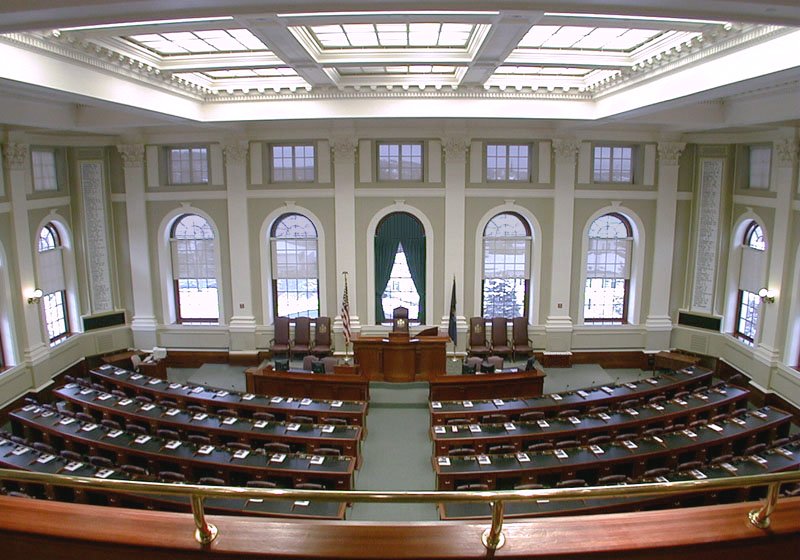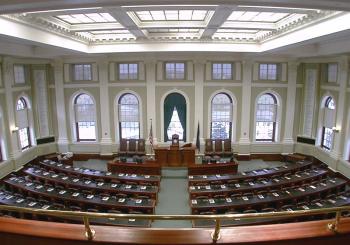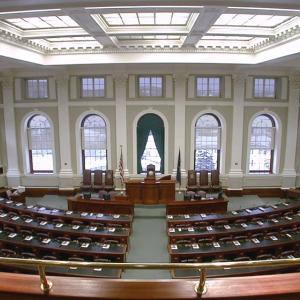Curry, Pluecker react to recent bills regarding PFAS
AUGUSTA — A pair of bills aimed at addressing the state’s “forever chemicals” issue cleared key steps on the path to becoming laws Monday, April 11.
LD 1911 “An Act To Prohibit the Contamination of Clean Soils with So-called Forever Chemicals” which bans the further spread of PFAS-containing sludge in Maine, passed a roll call vote on the floor of the House by a vote of 81 to 52.
The bill, which was put forward by Representative Bill Pluecker (I-Warren), needed 67 votes for passage from the House. The bill will now head to the Senate and, if passed there, Governor Mills’ desk to become public law.
LD 1911 contains a number of provisions, but debate on the House floor centered on “turning the faucet off” according to lawmakers in favor of the bill, who argued that now that experts have identified the harmful effects of PFAS, it is imperative that the state immediately curtail or stop further contamination of land, water, and populations by the “forever chemicals.”
The bill seeks to end the spread of “forever chemicals” in the state by authorizing wastewater testing facilities to test for PFAS contamination and report to the Department of Environmental Protection, prohibiting the spreading of Septage or municipal/industrial sludge in the state from any location tested to have elevated PFAS levels, prohibiting the issuance of new permits to spread PFAS-containing substances, and prohibiting the spread anywhere in the state of fertilizer, soil amendment, topsoil replacement or mulch made with PFAS-containing substances.
“I am so proud to have been able to make a difference for the farmers across the state who are suffering from PFAS contamination,” said Rep. Pluecker. “Their land, water, and families have been contaminated, and we must act now to protect future generations from a similar fate. This bill turns off the tap, so that we can protect our food supply. As a state, we must take the lead on protecting our farms and families from disease-causing chemicals.”
LD 2019, “An Act To Require the Registration of Adjuvants in the State and To Regulate the Distribution of Pesticides with Perfluoroalkyl and Polyfluoroalkyl Substances” which was also championed by Pluecker passed the Senate as well. It authorizes the Board of Pesticide Control to look at the ingredients in pesticides to ensure that Mainers are not unintentionally applying PFAS to crops and food.
“This bill is another step in turning off the tap on PFAS and getting it out of our food supply,” said Rep. Pluecker. “We must take action to protect the deer, fish, and food supply of our state from contamination. I am glad that both chambers of the legislature have been willing to work together to see this bill through the process.”
Late last week, April 7, the Maine Senate voted unanimously in support of LD 2013, “An Act Relating to Perfluoroalkyl and Polyfluoroalkyl Substances Contamination in the State.” An amended version of the bill would create a PFAS advisory committee and make a $100 million investment in PFAS testing and remediation.
“There is a mountain of information about PFAS in soils, groundwater, and unfortunately our farms that is just beginning to emerge here in Maine," said Sen. Chip Curry, D-Belfast. "There are farmers in Waldo County and across our state who have shut down their operations because of PFAS contamination. These farmers have put everything they have into their farms, and in some cases, jeopardized their own health too. We know this is a problem that needs to be addressed right now, and LD 2013 guarantees that we can continue vital work to do critical PFAS remediation work, combat contamination in our environment, and provide much needed assistance for Maine farmers."
As amended, LD 2013 would establish the Fund To Address PFAS Contamination within the Department of Agriculture, Conservation and Forestry and the corresponding Advisory Committee on the Fund To Address PFAS Contamination to make recommendations to the department regarding the administration of the fund.
The bill authorizes the department to allocate funds upon recommendation of the advisory committee and for certain purposes, including but not limited to monitoring the health of people in a household whose agricultural land is found to be contaminated by PFAS; conducting research; assisting an agricultural enterprise with land found to be contaminated by PFAS; funding for educational programs; and long-term monitoring of contaminated sites and establishing a corresponding centralized data repository. The bill also would provide one-time funding of $100 million to address PFAS contamination on agricultural land in Maine.
LD 2013 faces further votes in the Legislature.





























